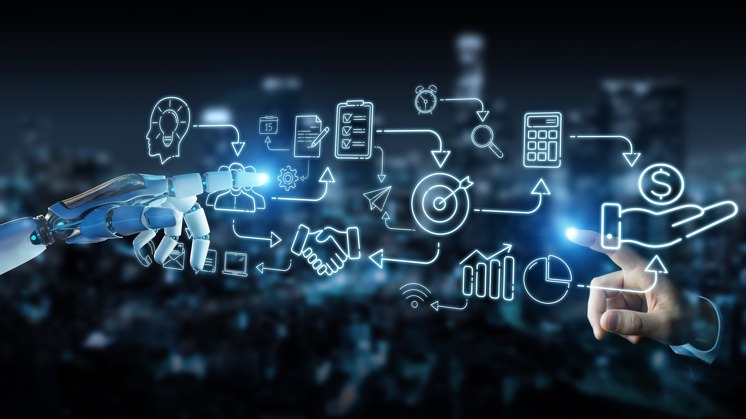In today’s fast-paced world, digital innovation has become a driving force behind change across industries, businesses, and society as a whole. From artificial intelligence (AI) and the Internet of Things (IoT) to blockchain and automation, digital technologies are reshaping the way we work, communicate, and live. The term “digital innovation” refers to the use of new technologies and digital platforms to create value, improve processes, and address complex challenges. As businesses embrace these technologies, they are unlocking new opportunities and redefining traditional business models.

The Role of Digital Innovation in Business Growth
Digital innovation has a profound impact on business growth. Companies that embrace emerging technologies and integrate them into their operations gain a competitive edge in an increasingly digital marketplace. For example, businesses that leverage cloud computing can improve their scalability, reduce costs, and enhance collaboration. Cloud-based services allow companies to store, manage, and access data remotely, which is crucial for seamless operations and global connectivity.
In addition to cloud computing, AI and machine learning are transforming industries by automating processes, providing insights from big data, and personalizing customer experiences. Retailers like Amazon use AI to recommend products, optimize inventory, and streamline logistics, while financial institutions use AI to detect fraud and provide tailored investment advice.
Digital innovation also helps companies develop new business models and revenue streams. For instance, subscription-based services and digital platforms, such as Spotify, Netflix, and Adobe, have disrupted traditional industries by offering consumers on-demand access to content, software, and services. These platforms leverage digital technologies to create seamless user experiences and scale their operations efficiently.
The Impact of Artificial Intelligence and Automation
Artificial Intelligence (AI) is one of the most transformative forces behind digital innovation. AI refers to the simulation of human intelligence in machines, allowing them to perform tasks that typically require human intervention, such as decision-making, speech recognition, and problem-solving. With AI, businesses can automate routine tasks, reduce human error, and improve efficiency.
In industries like healthcare, AI is revolutionizing diagnostics and patient care. AI-powered systems can analyze medical images, predict patient outcomes, and recommend treatment options, allowing healthcare professionals to make more accurate and timely decisions. Additionally, AI-driven chatbots and virtual assistants are improving customer service by providing immediate responses to inquiries and resolving issues without the need for human intervention.
Automation, a key component of AI, is also reshaping manufacturing and logistics. In industries such as automotive production, robots are now responsible for assembling components, ensuring precision, and reducing the risk of accidents. Automation allows companies to scale operations while minimizing labor costs and improving safety.
Blockchain Technology and Digital Trust
Blockchain technology, widely known for supporting cryptocurrencies like Bitcoin, is another key driver of digital innovation. Blockchain offers a decentralized and transparent system for securely recording transactions, making it highly attractive for industries that require secure and transparent data management.
For example, in supply chain management, blockchain enables companies to track the journey of products from manufacturer to consumer in real time, ensuring transparency and reducing the risk of fraud. Similarly, in finance, blockchain facilitates secure peer-to-peer transactions, cutting down on intermediaries and reducing the cost and time of financial exchanges.
Beyond financial transactions, blockchain is also being explored for use in healthcare, real estate, and voting systems. By enhancing trust and accountability, blockchain technology can drive innovation in sectors that rely heavily on data security and transparency.
The Internet of Things: Connecting the World
The Internet of Things (IoT) is another revolutionary digital innovation that is changing the way businesses and individuals interact with the world around them. IoT refers to the network of interconnected devices that communicate with one another and collect data to optimize performance and provide valuable insights. Smart devices, such as wearables, home assistants, and connected cars, are key examples of IoT technologies.
For businesses, IoT enables real-time monitoring of assets, improving efficiency and reducing downtime. For example, manufacturing companies use IoT sensors to monitor equipment performance and predict when maintenance is needed, minimizing costly breakdowns. Retailers leverage IoT to track inventory and streamline supply chains, ensuring that products are available when needed.
On a consumer level, IoT devices like smart thermostats, fitness trackers, and security cameras are enhancing convenience, comfort, and safety. These devices collect data on user habits and preferences, allowing them to make intelligent decisions, such as adjusting home temperatures or sending alerts when unusual activity is detected.
Digital Innovation and Sustainability
One of the emerging trends in digital innovation is its potential to promote sustainability. Technology can play a crucial role in addressing environmental challenges and creating more sustainable solutions for industries and consumers alike.
For example, digital innovation in energy management is helping companies and homes optimize energy usage. Smart grids and energy-efficient devices use real-time data to monitor and reduce energy consumption, leading to lower carbon footprints and cost savings. Similarly, AI and data analytics are being used to predict climate patterns, optimize agriculture, and reduce waste in manufacturing processes.
Moreover, digital platforms that promote circular economies, such as platforms for sharing or recycling goods, are helping to reduce waste and encourage more sustainable consumption habits. As technology continues to evolve, it will play an increasingly important role in achieving environmental goals and promoting sustainable practices across industries.
Overcoming Challenges of Digital Innovation
While digital innovation offers immense benefits, businesses and individuals face challenges in fully adopting these technologies. One of the primary barriers is the digital divide—unequal access to technology and internet connectivity. In both developed and developing countries, some communities may not have access to the necessary infrastructure or resources to benefit from digital innovation.
Furthermore, businesses must address the security and privacy concerns associated with the digital transformation. As more data is collected and shared, the risks of cyberattacks, data breaches, and misuse of personal information increase. Ensuring robust cybersecurity measures and adhering to privacy regulations will be critical to maintaining trust and protecting sensitive data.
Conclusion: The Future of Digital Innovation
Digital innovation is reshaping the future of business, society, and daily life. From AI and blockchain to IoT and sustainability initiatives, technology is creating new opportunities for growth, efficiency, and problem-solving. As businesses embrace these digital tools, they are not only enhancing their operations but also transforming industries and driving societal change.
However, to fully realize the potential of digital innovation, companies and governments must address challenges related to access, security, and privacy. By fostering collaboration, improving digital infrastructure, and embracing ethical technology use, we can ensure that digital innovation benefits everyone and creates a more connected, sustainable, and equitable future.
Read More : The Rise of Digital Innovation: Shaping the Future of Business and Society




